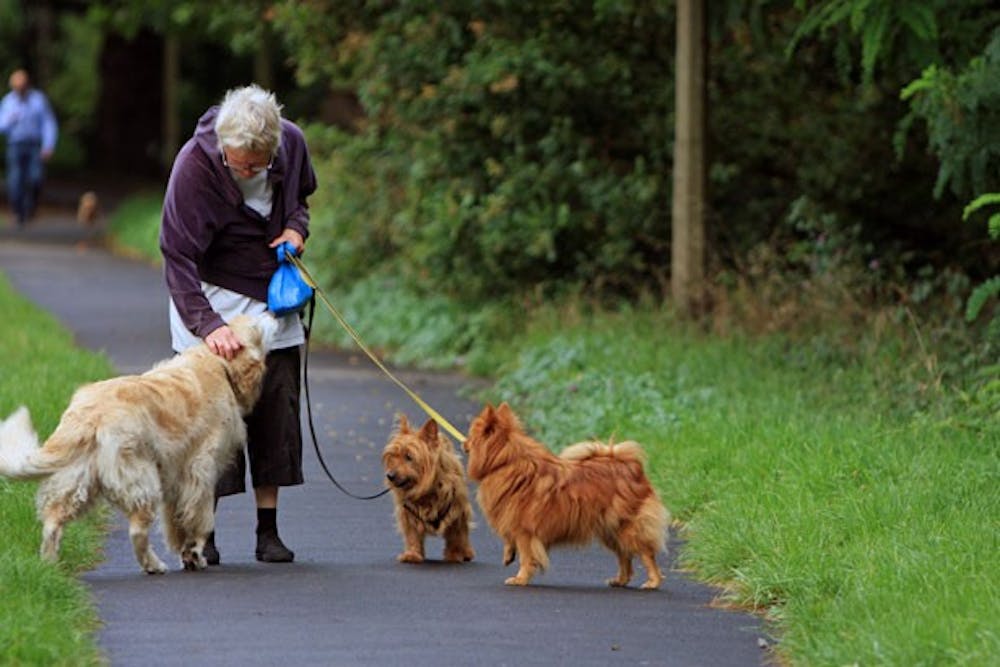Local community members, along with University students and current and former employees of the Charlottesville Albemarle Society for the Prevention of Cruelty of Animals, say there is significant animal neglect and a hostile work environment at CASPCA.
CASPCA Concerns is a group of animal advocates that have been raising awareness of alleged toxic employee and volunteer treatment at CASPCA, as well as cruel animal treatment. The group says CASPCA CEO Angie Gunter is to blame.
Fourth-year Education student Farise Cravens volunteers at the CASPCA and has noticed concerning details at the shelter firsthand. Cravens said that larger shelters such as the CASPCA have high intake numbers, especially because they are the first point of relocation for animals after natural disasters. Over time, the CASPCA accepted too many animals, which caused a shortage of space.
“Angie began to accept large quantities of animals, even when there wasn't space to properly care for them,” Cravens said. “And that's where certain dogs were being kept [in] small cages at all hours, and they couldn't even turn around.”
Though not directly associated with the CASPCA Concerns, animal advocates in Charlottesville held a protest Jan. 27 on account of these allegations. Actions taken by CASPCA Concerns include organizing letters and communications between their members and the board of directors.
Morgan Struble, a member of CASPCA Concerns, worked at the CASPCA from 2018 to late 2021. Her primary role was placement coordinator, transferring animals to the shelter and developing an adult dog foster program.
“I left [CASPCA] as a direct result of the management of Angie Gunter,” Struble said. “The work itself of animal welfare is emotional and demanding, but it was always made more difficult by the toxic work environment that [Gunter] created.”
Former and current employees and volunteers have shared their experiences online including CASPCA Board President Jenn Corbey said the SPCA Board has engaged with McGuireWoods law firm to conduct an independent review of the public’s criticisms and complaints. This law firm previously employed CASPCA Board Vice President Mike Derdeyn. Corbey said the review is expected to take 90 days, and it will include all relevant parties.
A March 2nd press release from CASPCA Cares said that the law firm is currently investigating current employees at the CASPCA. No previous staff or volunteers were involved. Current staff reported a lack of anonymity in the investigation, meaning that the law firm reminded all employees that what they are told can be reported back to the Board.
“The [SPCA] Board will assess the results and recommendations of the independent review and will take appropriate actions and make appropriate policy changes that stem from it,” Corbey wrote in an email statement to the Cavalier Daily.
Despite the ongoing protests, reports from CASPCA detail success, such as finding homes for a “record” number of animals. Many volunteers say the high success rate is because the organization relies on overworked individuals in a hostile work environment.
Volunteers allege treatment of the animals in the shelter has proven to be inadequate in recent months. Animals were reportedly found in too small of crates, in medical danger, receiving no enrichment and more. One dog died as a result.
Fourth-year Engineering student Christine Schultz also volunteers at the shelter and said several volunteers had to voice concern before a dog that was struggling to walk was given proper medical attention.
“It was just breaking my heart because it took them so long to have the staff get to her,” Schultz said.
Struble remembers when she began at the CASPCA, saying that the animals were initially receiving excellent care and that the shelter was not always this way. The shelter had substantial funding, as well as a low intake of animals in need from the local community.
Struble said problems started to arise when Gunter began to focus on large out-of-state transports — instead of focusing on the local and surrounding communities needing help.
“Even if the shelter was full, we would continue to transfer those dogs [which] were then housed in overflow crates,” Struble said. “Overflow crates should not be used as a form of housing for any significant time span.”
Cravens said that some improvements in the treatment of animals have been made in recent weeks, including beginning to house animals in crates that are large enough for movement. Still, activists say more changes need to happen.
Schultz said she’s never met Gunter, even though she has been a long-term volunteer at the shelter.
“I don't know her at all. I've never had a personal experience with her, but that's what I can share about her,” Schultz said. “I think that's kind of reflective that she doesn't even come to the shelter very often.”
CASPCA Concerns proposed solutions include hiring a new CEO and making improvements towards efforts for animal enrichment and welfare. CASPCA Concerns initially sent letters to the Board of Directors. However, little action was taken by the Board aside from their agreement to have a third-party investigation.
According to research found by CASPCA Concerns, a majority of board members have no experience in animal welfare.
Cravens said she is angry that the Board has not made more substantial changes because the problems are continuing to affect the animals’ quality of life. She also said community engagement in these shelters is important.
“What really hurts the animal shelters when there's not enough people volunteering,” Cravens said. “There's not enough people in the community that are offering to foster dogs or cats. And it just makes it harder for the shelter to operate when you know more animals need help.”
Updates on future actions will be posted on the CASPCA Concerns Facebook page. CASPCA Concerns also started a petition to raise awareness about the current shelter conditions which currently has over 2,000 signatures of their 2,500 goal.







